Hi There,
Welcome to the first of our 2013 Summer Movie Roundtable series. We’ll be doing a few of these throughout the summer and please add your own thoughts via the comments below.
Participating in our premiere discussion are Peter Briggs, Elizabeth Weitz, Bill Machon, Mark Wensel, Rich Handley, Jess Nevins, Ben Everhart, Steven T Boltz and Tani Marole.
Hope you enjoy, and beware of spoilers….
Stefan Blitz (FOG!)
editor-in-chief
FOG!: Let’s start with JJ Abrams and his crew of Orci, Kurtzman and Lindeloff and his affinity for “The Mystery Box”. Do you think that the film lived up to both the secrecy and it’s revelation?
Ben Everhart: Even though I’m a fan of JJ Abrams, and I actually really liked the movie while I was watching it, I think the marketing sleight-of-hand presented to us as a ‘mystery box’ gets a bit silly after awhile. I mean, back when the movie was announced, even my Mom said ‘oh it’s got Khan in it’ which at that point was only conjecture.
If Cumberbatch’s character had not been Khan, I think people genuinely would’ve been confused because when you don’t tell audiences something important before going into the theater, they make a ton of assumptions. And we’re all sophisticated enough to guess that it’s Khan and then when we’re told, ‘yeah, you’ve been right for two years,’ it’s not a big moment, at least it isn’t for me.
Perhaps if they had done something a little sneakier like made Cumberbatch’s character the same as the Judson Scott character from Wrath of Khan and his whole mission was waking his master up, that may have twisted expectation in an exciting way. Maybe that would have been worthy of all the secrecy? Probably not. But my point is you need to have a really, really good reason why you’re asking someone to pay $18.50 to see your movie without telling them who the bad guy is. And they didn’t have a good reason. So I just ignored all that ‘John Harrison’ stuff.
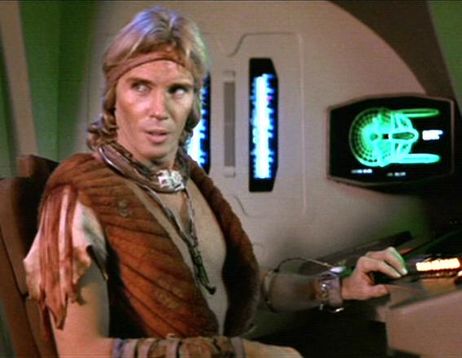 |
| Judson Scott in Wrath of Khan |
Peter Briggs: I’m with Ben on the “Mystery Box”. And as we’re writing a dissection piece about the movie here, which I hope people are reading after they’ve seen the film, I’m not going to buy into the non-spoiler aspect of it and tackle the Khan-thing head-on. I guess we’ve all seen that fairly fantastic Ted speech video that JJ Abrams made: Abrams is a tremendously gifted orator, and it’s not difficult from his patter to see why he’s been a phenomenally successful producer as result of that.
But, let’s be honest, it’s marketing flim-flam, specifically goal-oriented towards whipping-up Internet frenzy, and getting backsides in cinemas. He’s done it time and time again on various productions…and it works. (And as a Star Wars fan, I’m consequently dreading the next several years of behind-the-scenes teasing.) I would take anything Abrams says now with a very small salt mine; in fact, I’d like him to even prove there’s someone named “Kelvin” in his family!
But, returning to the movie: no. The film in no way lived up to the secrecy. And the “revelation” wasn’t just limp, but unnecessary. I spoiled myself with the reviews beforehand, and I’m glad I did. Had I not had a week or so’s buffer between learning it was Khan, I would have probably been furious. To be honest, Cumberbatch’s delivery of “I am Khan Noonian Singh” was so drenched in “meaning”, I would have loved it far more if Kirk had just shook his head in befuddlement and replied “I have no idea who that is.” I have a huge love for Wrath Of Khan and its characterizations and interplay, and that’s not even as a result of Khan himself.
He is, basically, a plot device.
Elizabeth Weitz: Secrecy or not everyone knew it would be Khan. While I appreciate Abrams’ desire to have a created secret embedded in his work, it has become kind of a schtick and people familiar with his work know it. When John Harrison (Cumberbatch) said his real name it wasn’t so much as a surprise as it was an “Abrams Moment” and no one in the theater seemed phased by it. In fact, there was barely a reaction. So in a sense, his big secret didn’t work.
Rich Handley: To be honest, I don’t believe it lived up to it at all. That he was playing Khan was one of the worst-kept secrets out there–people had guessed it long ago, and several Web sites had cited sources confirming that this was the case. If Abrams expected people to be shocked when the revelation happened, I don’t think he got his wish.
In the theater in which I saw the film (which, just to state upfront, I greatly enjoyed despite it having plot holes big enough to pilot the Enterprise through), the “My name… is Khan” revelation had a number of reactions from the audience: quiet chuckles, groans, people shaking their heads, and one guy outright laughing. I’m sure it was a surprise to a number of folks–after all, not everyone scours the Internet looking for rumors, like our type do–but I didn’t get the sense that most were generally pleased by the non-revelation revelation. It was more a case of a widespread “Seriously?” reaction, reminding me of Lost’s sixth season and series finale. (“So it WAS Purgatory? You guys kept saying it wasn’t, dammit!”)
Since someone had unfortunately spoiled Into Darkness’ non-secretive secrets for me ahead of time, I knew what was coming and was paying attention to others’ reactions, to see if theirs mirrored my own… which they did. And that’s unfortunate, as the film had a lot going for it, despite what I see as a complete misuse of Khan’s character. By the way, I highly recommend everyone stop what they’re doing and read this in its entirety: https://io9.com/star-trek-into-darkness-the-spoiler-faq-508927844.
Steven T Boltz: I don’t think it worked. We’re all so used to Abrams’ sleight of hand, we’re no longer looking at the Lovely Assistant. We’re beyond that. We know how the trick is done, and we just wait for the reveal.
Not unlike Lost, where everyone was crying “Purgatory” halfway through the first season, but Abrams and his writers deflected those cries, saying No, no, look: We have a hatch and Others and Tailies and a giant statue and time-travel and CJ from West Wing! How could it be Purgatory? It’s not Purgatory! Only to reveal that – wait for it – the island was Purgatory after all! We all knew it was going to be Khan.
There really wasn’t much doubt about that. Abrams should have run with it, played it up, and pulled something else from his Mystery Box.
Bill Machon: For me, yes. I miraculously avoided spoilers. The revelation was a surprise and I loved it.
Ben Everhart: Interesting. Question for you though: now that you know who the villain is, and the reveal has effectively been ‘spoiled’, does that affect the re-watchability experience for you?
A reveal like the ones in The Sixth Sense, The Book of Eli and Fight Club deepen the second viewings. But I don’t think the Into Darkness reveal makes us re-evaluate anything from the first half of the movie. It’s a reveal for its own sake instead of a truly revelatory experience.
A lot of folks have been writing about this over the past week — and it really is one of the most talked-about issues around this movie. I think that’s somewhat sad. I don’t think the marketing plan should inform storytelling choices.
Ten years from now, no one’s going to care about what the ad campaign did or did not ‘spoil’, they’re going to click play sit back and wonder what motivated the reveal of the villain’s identity so late in the movie. Don’t get me wrong, I’m not against a late reveal of the name “Khan” but it really feels to me like the only reason they do it is so the press materials can use the name “John Harrison.”
But I should admit, I have a somewhat controversial viewpoint on spoilers in movie marketing. I think people consciously over-estimate how much they love surprises when they go to the theater. Case in point: if a filmmaker adapts a popular book and makes a change — effectively a “surprise” — they’re often drawn and quartered in the public square. How dare they surprise me!
The most important thing in movie marketing — in all marketing, really — is delivering on people’s expectations. If people go expecting a monster movie and instead you bait-and-switch them with a philosophical science fiction piece about humanity’s place in the universe they get pissed off.
That’s one of the things that led to all the disappointment around Prometheus. (Not the only thing — but a contributing factor for sure.) Holding back details about your movie leaves room for people to make suppositions about what they’re going to see — human beings can’t help that — and invariably whatever someone invents on their own is so tailored to their own desires the final product can feel like a let down.
I honestly wonder if the Into Darkness’ box office is lower than expected because all the mystery just confused people instead of enhancing the experience? I don’t know for certain but I’m wondering if that’s the case. In a Three Act structure, Act Two is typically thought of as what your movie is “about”. It’s the set-up, essentially. And maybe they held back too much of that part of the narrative so some movie-goers didn’t think there was an actual story?
Bill Machon: I have not seen the film a second time yet, but plan to. I’m sure that the “reveal” will mean less. There’s no way that it can’t. But I still think I’ll enjoy it. I do wonder though… it seems perhaps so much emphasis was put on the moment of the reveal, that much of the rest of the plot was designed and executed to be non-Khan, which actually takes away from the full potential that Khan could have been. This might be more noticeable once I see it a second time. I’m thinking that if offered the choice, I’d probably replace both Marcus characters with more Khan.
Or at the very least replace Admiral Marcus with Khan, and replace Carol Marcus with Marla McGivers.
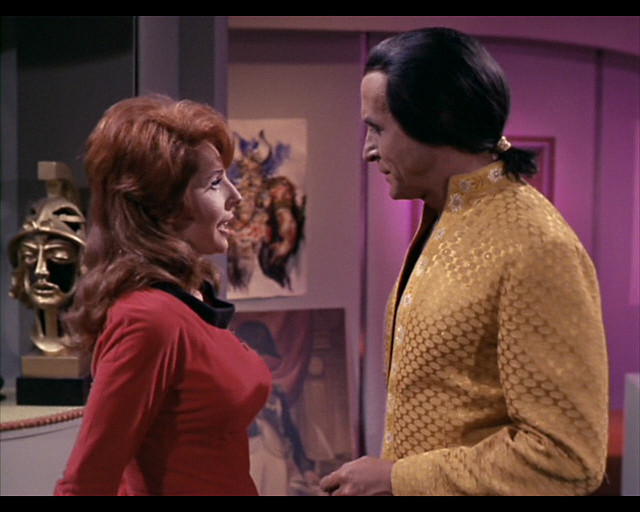 |
| Lt. Marla McGivers and future husband, Khan Noonien Singh |
Steven T Boltz: It affects the rewatchability only if you’re rewatching the movie for that particular hook. If you’re watching Fight Club again and are bored because you already know about Tyler Durden, you’re watching for the wrong reasons. I can’t tell you how many times I’ve seen The Empire Strikes Back, but I still get a thrill from the “I am your father” line.
Ben Everhart: Yeah, that’s kinda my point though. Those hooks are revelatory. In the context of the movie itself, the Khan reveal doesn’t really mean much. Kirk has to kind of go “Who’s Khan?” and then we get that exposition. I still really like the movie, it’s definitely fun to watch — it just doesn’t hold up to scrutiny. And I feel like more attention was expended on mystery-marketing than creating a classic story that holds up for repeat viewings.
Mark Wensel: I was still basically in the dark when I saw the movie and I was glad to be. Sure, it’s a reveal for a reveal’s sake, but that certainly didn’t make me dislike the movie at all. I had heard all of the “It’s not Khan” interviews and, while I didn’t buy them completely, I bought them enough to very nearly almost be surprised.
What gets me is the idea that it’s now second nature to know everything about movies before they come out. We get angry if someone lies in order for there to be some sort of surprise in the movie. I’m kind of ok with people like JJ Abrams who are vehemently against spoilers.
I wasn’t around when Psycho came out, but no one wanted the audience to know that the star of the film died half-way through the movie. While it wasn’t the point of the film, it was a VERY big deal. I like knowing hardly anything going in. We live in a world where everyone has to know everything and it’s kind of annoying. The internet has spoiled so many movies. (He says as he writes for two websites.)
STB: I get your point, Ben – I’m agreeing with you. The Fight Club reveal is revelatory, as you said, and will make a second viewing a different experience altogether. You can never watch Fight Club (or Sixth Sense or whatever) the same way once having seen it. As the “Khan” reveal (or Khan “reveal”) did very little for the story, it won’t affect a second viewing.
I’ve often said (lamented, really) that I would love to have seen Psycho on its initial release.
Imagining what audiences felt when Marion Crane gets hacked to death in the shower… But I grew up in a time when that was part of pop culture. I knew she died before I’d ever seen the film.
I knew Norman Bates was “Mother” before I even knew the film existed because of a music video for “My Name is Norman Bates” by a band called Landscape.
The “Khan” reveal is nothing at all like that. It was a reveal to the audience, not to the characters. (As Ben said, above, Kirk was like, “Who’s Khan?”) Whether you know John Harrison is Khan or not, it still means very little in the end.
Ben Everhart: Excellent points. I’ve had the same experience you both had with Psycho. I think it is worth noting though that in 1982, Khan’s name was right there in the title. May have been a spoiler but that term wasn’t even invented yet. And even though I liked Into Darkness, it isn’t The Wrath of Khan. Surprises can certainly add a lot to a movie. And maybe we do get too much prior to walking in the theater in some cases. But good story-telling will always trump gimmicks.
FOG!: Attempting to distinguish itself as a new timeline, the film seems to forget that there’s more to the Federation than Starfleet. Does the militaristic approach of Admiral Marcus negate Roddenberry’s vision?
Ben Everhart: The conflict between what Starfleet is and what it should be is actually one of the elements that I feel is most Star Trek about the movie. And I’m probably gonna get my ass kicked for saying this, but I think Gene Roddenberry would approve.
One of the most enduring elements of the original series was its socio-political commentary and the ‘warriors vs. peaceful explorers’ theme was definitely there throughout. There were definitely circumstances where misguided Starfleet personnel took a militaristic view which led to catastrophe and Into Darkness is consistent with those episodes.
I think it’s one of the great thru-lines of the movie that Starfleet is having an identity crisis that is ultimately resolved in a positive way (although I’d point out that the 5 year mission is already established at the beginning, when Kirk thinks Pike is going to assign it to him only to discover he’s been reported for violating the ‘Prime Directive.’) I’d also add that this is a very Zeitgeisty topic given our own identity crisis when facing global terrorism. A Star Trek movie should ideally make some sort of provocative statement about modern times and I think this plotline does that.
Peter Briggs: Yes, and no. It’s not really worth pondering, because the stable door’s long been shut on that particular filly, and as Ben says it was even dealt with to a degree in The Original Series. Let’s be honest, this is this movie’s writers just lazily picking Star Trek VI: The Undiscovered Country off their video shelf and plucking out the Cold War Paranoia plot points. Nothing more.
Jess Nevins: Disagree with the question. The point of the film is that the Admiral Marcus has forgotten that there’s more to the Federation than Starfleet, and that the militaristic approach of Marcus is wrong–as Spock says from the start and as Kirk comes around to believing. The film is a critique of US foreign policy masquerading as an sf shoot-em-up, and in those terms it’s actually an affirmation of Roddenberry’s vision.
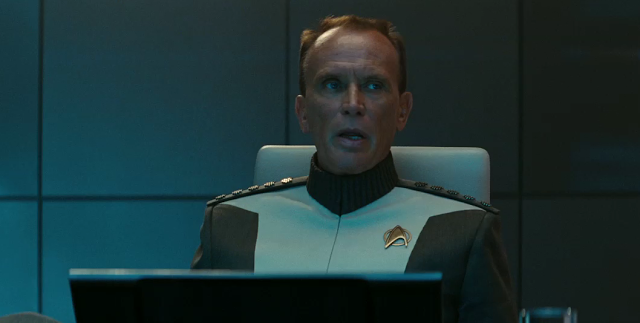 |
| Admiral Marcus (Peter Weller) |
Elizabeth Weitz: I agree with Jess Nevins. Admiral Marcus is very much a Dick Cheney-ish character who believes that war is inevitable and will justify his actions by trying to convince people that they need to act first ( the “If we don’t fight them there, they will fight us here” mentality). But the Roddenberry idea of peace and diplomacy is still upheld by Kirk who doesn’t act on his orders even though he yearns for revenge. His decision to listen to reason and take in Khan instead of killing him makes it clear that the Star Trek ideal is still very much alive.
Rich Handley: I agree with the others above me. The film lives up to Roddenberry’s vision by commenting on the current socio-political structure of the United States, and of the world. Marcus is the villain, not a hero–the film condemns his actions and attitudes. In that regard, it has not jettisoned Roddenberry’s ideals–it has upheld them.
Sure, there are shades of The Undiscovered Country in the plot, but let’s be honest–several of the other Trek films don’t have entirely original plots, either. The Motion Picture was The Changeling. The Wrath of Khan was “Moby Dick meets Space Seed,” First Contact was “Moby Dick meets the Borg,” and so forth. Even the 2009 film had heavy shades of Nemesis, which had heavy shades of The Wrath of Khan. Plus, the last three films have all had very similar revenge plots.
Now, I’m OK with a story being derivative, provided it’s done well. Into Darkness is, to some extent, done well, in my opinion… aside from Harrison being Khan, which is where I think the plot starts to unravel. For me, the film is not at all at odds with what Roddenberry would have wanted–but it IS at odds with logic and common sense, frequently.
Ben Everhart: Great comment, Rich. That description of “Wrath of Khan” (“Moby Dick meets Space Seed”) is one I hadn’t heard before and it’s damn near perfect. As an aside to this question, I’d like to add I did like the little references to The Original Series episodes throughout. Even though the Tribble blood ended up being a deus ex machina, I loved its initial appearance. Also, did anyone else catch that the shuttle they used to go to Kronos was one they picked up “during the Mudd incident?”
Rich Handley: Thanks! Yep, that Mudd reference was specifically to IDW’s comic book prequel series Countdown to Darkness, in which Kirk confiscated the shuttle from…. Harry Mudd’s half-Bajoran daughter. (I kid you not.)
Peter Briggs: Given Khan has Moby Dick on the shelf on the Botany Bay, and he quotes from it repeatedly, Wrath Of Khan has always obviously been “Moby Dick meets Space Seed”! I hope you guys noticed the Daystrom Institute getting referenced.
Steven T Boltz: Like Ben, I think Roddenberry would be on board with this idea. Largely because Marcus is the bad guy in this scenario. The fact that Marcus goes against Roddenberry’s vision and is defeated, that’s actually kind of in line with Roddenberry’s vision. Innit?
Bill Machon: No. Roddenberry’s vision was idealistic but there was no way Roddenberry was so unrealistic that something like Section 31 and someone like Admiral Marcus couldn’t exist. After Roddenberry’s death, these darker elements were explored in Deep Space Nine and in Enterprise.
FOG!: What are your thoughts of both Benedict Cumberbatch’s character and the climax of the film paying homage to Wrath of Khan?
Ben Everhart: Yeah, this is probably the weakest aspect of the movie. You can argue that it plays without having any knowledge of Wrath of Khan — but c’mon. At this point in their life cycle, Kirk and Spock haven’t earned the BIG martyr moment that is still one of the most powerful character deaths in movies. They made a choice to try and do Space Seed and Wrath of Khan in one story and I think it may have been more satisfying to just do the origin story and then set up a Wrath of Khan movie 19 years from now.
Peter Briggs: Again, I’m with Ben. When you see Khan in Space Seed, he’s already been through the Eugenics Wars, and in all likelihood weathered all kinds of battles, machinations, and betrayals. I can’t see that some Starfleet Admiral in the “Civilized” 23rd Century is going to radically alter Khan’s personality so that what we’re seeing in this film is so wide of the beam. Given that the events that led to Khan being frozen happened long before Nero’s incursion into the timestream in the reboot movie, the way Khan is portrayed in Into Darkness is just wrong, wrong, wrong. I mean, look: what is this? Demolition Man?
Peaceful future society unthaws cryogenically-frozen über bad-guy, to misguidedly shake things up? Marcus’ explanation that Khan was there to help design weaponry was patently ridiculous, not just for the reason that it’d be like asking the brightest spark from 1800 to come and help you design your GPS missile tracking systems. And, it rankled me that Cumberbatch’s Khan — snarling his way through his performance, with barely a hint of Montalban’s “Fine Corinthian Leather” — kept banging on about his “savagery”. Really? What happened to the “superior intellect”?
Jess Nevins: Fine character, fine performance…it just should have been an original character, not Khan. Agreed that they haven’t earned the martyr moment or for that matter the symbolic heft of Khan being Khan.
Elizabeth Weitz: I think Benedict did a good job (although I will admit it was hard to adjust to him since I keep seeing Ricardo Montalban) but I don’t feel the movie really established his character. At no point did they discuss his previous actions nor was there any backstory about him. The result of which was the audience couldn’t really comprehend why he would do what he did in the film.
As for the ending, I can appreciate the twist where Kirk died instead of Spock. It was a nod to Star Trek II and for fans of the original movie, it sort of said “Yeah, we know there’s a new timeline but similar things will unfold during this particular series that you are familiar with” . Although I did have an issue with Kirk’s resurrection that I’ll talk about later.
Rich Handley: Cumberbatch was mesmerizing, as I expected him to be. It’s just a shame that the writing of the character didn’t live up to his ability. The writers seemed not to understand Khan’s character at all, which is probably the film’s biggest failing.
Khan is described (by Spock, no less) as being genocidal, and as being someone who wiped out any one who was inferior to him. And yet, that’s pretty much the OPPOSITE of what Khan was, as Spock well knows. Khan was never about genocide–he was about power. He was about ruling others. He was a tyrant, yes, but he was a tyrant who maintained power without carrying out genocide. There was little killing and few wars under his leadership. And that makes sense, really–all he wanted was to rule. Why would you kill all the people you wanted to rule over?
Into Darkness makes the mistake of presenting him as a Hitler figure, which he clearly, from Space Seed, was not.
There’s also the problem of Spock Prime’s claim that Khan was the greatest threat Starfleet ever knew. Really? The greatest threat? A man who was thawed out of hypersleep and took over the Enterprise for maybe a couple of hours, then was defeated by being beaten over the head with a small pipe, and then was marooned for 20 years on a barren world, from which he eventually escaped… only to die a short time later?
THAT Khan was the greatest threat?
Don’t get me wrong, Montalban’s Khan was iconic and a fantastic villain. But Starfleet’s biggest threat?
Why, just because Spock died during the battle? He was more dangerous than the Doomsday Machine? The space amoeba? V’Ger? The whale probe? The parasites? The Klingons? The Romulans? The Cardassians? The Kzinti? The BORG? The Dominion? The Xindi? Q?
Uh… no. By forgetting what Khan’s place in Star Trek history really was, and instead presenting it as something else entirely, the writers went so far into hyperbole as to come off as people who really don’t know their Star Trek–which is weird, as they clearly DO know their Star Trek, given the many elements incorporated into these films from the books, comics, animated series, etc. (George and Wynona Kirk from the novels, Sarek’s dialog from Yesteryear about logic offering serenity, and so forth). I actually wish, if they felt the need to use Khan’s people, that they’d made him someone else.
Heck, Cumberbatch looks a good deal like Judson Scott–so make him Joachim. Some of the film’s big plot holes (Khan’s nationality and backstory, for example) would have instantly vanished, and the big reveal would have NOT been the predictable anticlimax it turned out to be. Heck, maybe Joachim had magic blood in the original timeline, who knows? Anyway, I’ve strayed from the question.
Regarding the film’s climax, this, for me, was the biggest mistake. (And again, to be clear, I LIKED the movie, lest anyone brand me a “hater”.) It didn’t come off as an homage–it came off as a complete lift, only done inferiorly. And the emotion behind the Kirk death scene was a cheat. Kirk and Spock barely know each other in this timeline, and barely even like each other. Spock’s death in Wrath of Khan was devastating because of the history behind it–many years’ worth–and the great love the two men had for each other. This time, the emotion wasn’t earned, in my opinion.
Peter Briggs: Here’s a thought. If we’d have gone with these guys apparently being some kind of “supersoldiers”, and never really mentioning Khan or the Botany Bay specifically, that final shot of Cumberbatch in the cryo capsule could have actually been a piece of inserted CG from some footage from the 60s or 70s of Montalban instead. Now, that would have been fun.
Steven T Boltz: The creation of the alternate universe changed many things, but it doesn’t negate what came before it. Cumberbatch was stellar, of course. But he wasn’t Khan.
Watching him follow Ricardo Montalban in Space Seed is like watching Julianne Moore in Hannibal, or Harrison Ford in Patriot Games: Forget that there’s a different actor in the role; they’re not even playing the same character. The only way Cumberbatch kinda works in the role is if you haven’t seen either Space Seed or Wrath of Khan. And if that’s the case, what the hell is wrong with you?
As to the climax of the film paying homage to Wrath of Khan, it didn’t go over very well with me. Kirk’s cry of “Khaaaaan!” has become a pop culture reference identifiable even by those not familiar with the source. Once Futurama’s done it, you just have to move on.
When Quinto raised his head and repeated the cry, I chuckled a bit and shook my head. Come on, Abrams. You created this alternate timeline exactly so you wouldn’t be beholden to the original series and films, to be able to create your own universe. Do that.
Bill Machon: Love Cumberbatch and loved him as what Khan essentially is (a superhuman villain), but it’s embarrassing that a white British actor was cast as Khan. Actors such as Alexander Siddig, Faran Tahir, Naveen Andrews, or Ajay Naidu would all have been more appropriate. I love Cumberbatch, he was excellent. But he’s white. I mean, c’mon.
Mark Wensel: And a man from Mexico should play a man named Khan? I think we’re beyond telling Star Trek to not be color-blind in its casting.
I liked Cumberbatch as Khan. I also like the fact that Abrams films are showing that the same things happen to these characters, just in different ways. Khan has to cross their paths. One of the leaders has to sacrifice himself to save everyone else. Carol Marcus has to come into Kirk’s life. And, yes, someone has to scream Khan’s name. (I don’t think anyone giggled in the theatre I was in. I could be wrong.)
Bill Machon: Would you be ok re-casting Uhura as white and British? It’s one thing to flip the race of a character whose backstory doesn’t include a specific ethnic heritage. Uhura is African, Khan is Indian. A person of color should play both.
Cumberbatch is cast perfectly as a superhuman villain. He’s fantastic in the film. But as Khan? It’s strange.
FOG!: Does the new timeline created by Nero successfully work? And does the continued presence of Spock Prime enhance or handicap the new series?
Ben Everhart: Spock Prime didn’t need to be in this movie. Or there needed to be a more compelling reason for him to be contacted.
Peter Briggs: Again, what Ben said. (C’mon, Ben: say something I can disagree with!) As far as the timeline, sure. It’s fine.
As far as Spock Prime: it’s always nice to see Nimoy, but what Spock says in this movie is a bit of a head-scratcher. Granted, Khan caused Spock Prime’s death.
But is Khan REALLY the most dangerous adversary they’ve ever encountered, when they’ve gone up against individuals with the terrifying powers of Gary Mitchell, or Apollo?
And, bear in mind that Khan’s actions in Space Seed are motivated largely by a need for escape; and then later through just good old-fashioned being pissed off. Spock ought to “logically” factor in that this timestream’s Khan may not act in the same fashion.
Jess Nevins: Bwuh? Khan is a genocidal eugenicist–that’s his background. Of COURSE he’s going to act like a villain, regardless of his motivations in Space Seed or Wrath of Khan.
Rich Handley: See my comments above, though–he WASN’T genocidal. That’s not how he was ever portrayed before this movie.
Elizabeth Weitz: I still don’t know how I feel about the timeline yet. I know it’s necessary to establish a new take on the characters without having to deal with the former storylines but whether or not it works, we have to see. I still have a couple of issues with it but then again I’ve watched every Star Trek series and I am extremely familiar with the characters so perhaps my indecisiveness is based purely on nostalgia.
The fact that Prime Spock shows up in this film feels a bit lazy, like a thrown in gimmick. In the first film, there was a reason for his presence but here, there was no reason to call him at all and I’m surprised they did. I guess it was meant more for the Trekkers than for a general audience.
Rich Handley: Spock Prime seemed shoehorned in.
I was intrigued when I heard that Nimoy would be in the movie again… but the scene turned out to be tacked on and unnecessary. Spock Prime comes off as a self-serving hypocrite by telling what he knows just because he’s reminded of his prior death, and his claims about Khan, as I explained above, don’t ring at all true.
Plus, nothing Spock Prime tells Quinto-Spock really helps him defeat Khan anyway–the exchange was rather pointless, in the end.
Steven T Boltz: It has the potential to work, if Abrams and co. would bother to use it next time instead of remaking another episode of the original series. I think Spock Prime actually enhances the new series, in that his presence serves to remind us of the alternate timeline.
Bill Machon: I love Spock Prime in this timeline. It totally works. I consider this a sideways timeline, not a rebooted timeline. JJ did this in Fringe, it’s fun.
Mark Wensel: I was annoyed with Spock Prime’s appearance at first. Then I thought about it. I would do the exact same thing if I had that resource at hand. “Hey, Alternate Universe Mark! How did you get through this rough time in our life?” I’d be on the phone with myself all the freakin’ time.
FOG!: Thoughts on the reimagined Klingons?
Ben Everhart: Loved them.
Peter Briggs: Meh. No feelings either way. The Klingon fight was one of the weakest parts of the movie for me. Dan Mindel’s photography in this film is astonishingly good, but when it got to that section, it felt like someone had dumped a marginally more amped-up Next Generation fight scene in there.
Jess Nevins: Not that reimagined, I thought. Nicely updated visuals, but otherwise I didn’t see them as much different from The Next Generation and following Klingons.
Elizabeth Weitz:: They were basically the same. Didn’t have a problem with them.
Rich Handley: Lots of fun–I hope to see more of them in a future film. I especially got a chuckle out of what appears to be Praxis being destroyed decades earlier than before. It makes complete sense. Given Nero’s destruction of the Klingon fleet in the 2009 movie, the Empire would have immediately ramped up production, which would have, in turn, ramped up mining… and kaboom, the Praxis incident moves up as a result.
Peter Briggs: I laughed at the Praxis thing, too!
Steven T Boltz: They were okay. Though, I’m with Jess Nevins and Elizabeth Weitz in not finding them to be all that reimagined.
Bill Machon: Generally fantastic, but I didn’t like the blue eyes. I especially liked the look and feel of Kronos and those Birds of Prey. Praxis was a treat as well.
FOG!: Does the post mortem resurrection of Kirk lend credence to the character now being invulnerable and genetically superior as a result of the blood transfusion?
Ben Everhart: I was confused about that too. And the little girl who was healed in the beginning? Is she super-human now as well?
Peter Briggs: Yeah. I mean, Indy obviously had a slug from the Holy Grail to be able to avoid being pulped inside a fridge and irradiated by an atomic explosion. Clearly, Kirk is now going to laugh good-naturedly the next time he gets into a bar fight.
Jess Nevins: Agreed. I don’t think Abrams et al thought through the consequences of the plot. (Don’t forget, the Tribble is now super-Tribble-rian as well!)
Rich Handley: Unfortunately, I have a feeling the films will never address this, though the IDW comics might.
As Jess Nevins pointed out, the Star Trek universe now has a super-Tribble, a super-kid and a super-Kirk running (or, in the tribble’s case, crawling) around. I doubt we’ll ever see super-kid or super-tribble again (just imagine how quickly a super-tribble would reproduce, by the way), and I have a feeling super-Kirk will just be normal-Kirk again.
It’s Heroes all over again. (Spoiler alert for anyone who hasn’t seen that series.) Claire Bennett’s blood could heal people, and a transfusion could bring people back from the dead. But afterwards, that person then went back to being non-immortal, and little was ever said about it again.
Only Claire retained the healing ability. I have a feeling that’ll be the case here. I don’t foresee the writers dealing with the ramifications of what has happened. It’s not really their style.
Elizabeth Weitz: To be honest, I thought that the whole blood thing wasn’t thought out very well (another Mystery Box perhaps?) How super-human is it? Does it merely heal? Does it give powers? What the F*ck does it do? And if it does provide super-human powers and Kirk is now imbued with these powers, is Star Trek about to become a Marvel-like franchise?
Rich Handley: Agreed, Elizabeth. And it came out of nowhere.
Now, that said, just to give the writers some credit on this, Space Seed did have McCoy reporting that Khan’s blood had unusual regenerative properties. So there is precedent for this. Still, I think they took it one step too far, and too literally. Now, no one ever need die again–Khan’s blood is a magical cure-all elixir.
Between that and transwarp beaming eliminating the need for spaceships, Starfleet personnel can now live forever and go anywhere in the universe in the blink of an eye. Our heroes are becoming too powerful and invulnerable–if this continues, it’ll be Crisis on Infinite Earths time.
Steven T Boltz:: I’m with Rich: I don’t think it’ll come up again.
Bill Machon: Yes! Love this possibility! Hope they run with it in the next film. Perhaps they could go in an Anakin Skywalker or Gary Mitchell direction, with an unfrozen Khan luring Kirk to the dark side.
Mark Wensel: It won’t come up again because this sort of thing never comes up again in Star Trek…except maybe in DS9. I think they should have dragged Kirk’s death out like the original movies did. Wait until next time to see how he came back to life.
FOG!: What are your thoughts on the crew, Pike, and the addition of Admiral and Carol Marcus to the mythos at this junction?
Ben Everhart: I think the Pike/Kirk relationship is one of the most successful aspects to these last two movies. Can’t say the same for the Marcus’ — but maybe they’ll pay off their appearance in a ‘Return of Khan’ film 19 years from now? (Isn’t that how old David is?)
Peter Briggs: Pike’s the best thing in the movie. Marcus just behaves like a total ass. I didn’t buy half of his motivations and responses in this movie. Weller still acts the role terrifically, but the writers stuffed the part.
Rich Handley: My three favorite aspects of these films are Urban as McCoy, the humor (when not too overdone) and… Pike.
In my opinion, the best thing Abrams did was to cast Greenwood as Pike and give him some damn fine material to work with. His character will be missed.
As for Carol Marcus… well… as a character who could have brought some depth to the film, given her backstory in Wrath of Khan, and who could have been a fascinating addition to the mythos, setting the stage for future events… er… she sure was hot, wasn’t she?
Sorry, but that’s really all the character brought to the movie. Alice Eve’s a competent enough actor and probably could have risen to the occasion if given anything meaningful to do, but the writers seemed more intent on making sure we didn’t forget that she’s gorgeous and curvy. In my opinion, that undermined the character’s (and the actress’) credibility. Plus, there was little logic to her being in this film in the first place. She sneaks aboard the Federation flagship using fake credentials… a serious crime, mind you… in order to protest her treasonous father?
And once she gets there, is she arrested? Reprimanded? Given even a stern “shame on you” look?
No. She’s treated with respect and made a permanent member of the crew. What?
Elizabeth Weitz: Pike and Kirk’s relationship was definitely powerful. He was the father that Kirk never had and when he took away Kirk’s ship (after the whole mishap at Nibiru), it was definitely like a parent disciplining a child. When Pike dies you can really understand why Kirk wants revenge and isn’t opposed to killing Khan with 72 torpedos even though that isn’t what Pike would want him to do.
The power who drives Kirk to seek revenge, Admiral Marcus, is, as I said before, very much a power-hungry ideologue who believe that Might is Right, and his way appeals to a very hurt and angry Kirk until his friends and fellow Starfleet members remind him about the principles that guide the Federation.
It is those principles that make Star Trek well, Star Trek and it’s nice to see that logic and reason prevails over anger and sorrow.
As for Marcus’ daughter Carol. I feel that she contributed nothing to the story except to establish a love interest for Kirk down the line.
Ben Everhart: When I saw Spock mind-meld with a dying Pike, I wondered if this was perhaps a set-up to a potential variant on the Menagerie plotline.
Obviously, Pike’s physical body is destroyed. But I wondered if perhaps his consciousness could be theoretically extracted from Spock. It’s a stretch, I know (a little like when Kenny lived inside Cartman on South Park). But it was a fanboy thought. That wouldn’t be something you’d necessarily do in a tentpole movie but perhaps in the comics, video games and other mediums, it’s a possibility.
Peter Briggs: Didn’t you think it was interesting that Kirk’s lechery has already driven Christine Chapel to the far edge of the universe? I hope Uhura knows how to make Plomeek soup down the line. Although given Vulcan’s gone kablooie, maybe lirpa-swinging isn’t on the agenda. I didn’t even comment on Carol, as she seemed like some Buffy/Scooby-Doo/Lois Lane plot device. And I guess if Kirk is scoping out all the ladies while Carol is tagging along on the mission, David stands a good chance of never being born.
And maybe even her being sidetracked means the Genesis Device research never happens, also.
Steven T Boltz: I have no comment on the matter.
Bill Machon: Bruce Greenwood as Pike is 100% WIN. Sad to see him killed off because would have loved more of him in at least one more film. Peter Weller is always great, and Alice Eve was so-so as Carol Marcus. She was good enough. I liked the dynamic of including those two Marcus characters.
FOG!: What are the things that you enjoyed most about the film?
Ben Everhart: Despite some of the complaints and criticisms I’ve levelled here, I was definitely engaged with the movie throughout. And honestly, I not only had a blast but kinda loved it. The movie is a rousing, cinematic experience that was fresh, inventive and generally well-crafted. There’s a lot of energy. It starts “en medias res” and doesn’t let up but it still somehow tells an actual story with a compelling, fully-defined character arc. It isn’t just noise, in other words, noise with jokes in-between like Iron Man 3. Into Darkness is fun to watch. A lot of fun. I’ve seen it twice already and feel like I have at least one more theatrical viewing in me before a Blu-ray purchase.
Peter Briggs: I can disagree with Ben finally. I loved the first act, right up to the Transwarp Teleporter, but then I had grave reservations. I’ll go into that a bit further down.
I liked Chris Pine’s performance very, very much. He’s turning into a terrific actor. It was nice to see Simon Pegg get more to do…although, I can’t help but think he perhaps got to do a tad too much. Bruce Greenwood can do no wrong. The production design was incredible; staggeringly dense in places: I can’t imagine how much design effort went into this in the art department. The visual effects were simply beautiful. Dan Mindel made this flat-out the best photographed of the Star Trek movies. Abrams is a fine staging director.
Rich Handley: I actually liked a lot about it, even though I do have the above criticisms. Pine and Quinto were fantastic, as were Cumberbatch, Greenwood, Urban and Weller. (I just wish McCoy had more to do.) And I finally warmed up to Pegg as Scotty, thanks to the writers finally remembering that Scotty is NOT Austin Powers, there only for comic relief–he’s a man of principles and at times a very serious individual. In addition, the music was excellent, the action scenes were amazing, the opening sequence involving the Prime Directive and the volcano made me grin like an idiot, and the terrorism scenes involving the bombing of London and the father willing to die to save his kid were quite powerful.
I just wish the second half of the film had lived up to all the potential that the first half offered. By the time we started getting into magic blood, lightning-fast chase scenes through the streets, Kirk yet again falling or hanging off every damn thing he could find to fall or hang off of, the ripoff death scene, and so forth, I found myself getting a sinking feeling. (Notice I’ve not discussed the fact that they turned a Hulk Hogan-sized Sikh Indian warrior portrayed by a Spaniard into a thin, pasty-faced Brit… I’m not even going to get into that. The Internet has already exploded over that one, so there’s not much more I could add that hasn’t already been said.)
Elizabeth Weitz: The thing about an Abrams movie is that even though, when you dissect it and see problems, you have a good time watching it. That’s his power. Making a movie you will criticize but still have an awesome time watching it.
It’s a gift.
Rich Handley: What Elizabeth said. :)
Peter Briggs: I’m totally the reverse to you guys. Maybe it’s because I do that vocation for a living, but all I see is a stack of really sloppy writing. A good General should be making his troops get it right. That lack of story-tightening ability worries me greatly for Star Wars.
Rich Handley: Oh, the writing is definitely sloppy–you’ll get no argument from me on that one. (I’m an editor by trade, and there are many times in the film when I found myself cringing over that very problem.) Luckily for Star Wars, though… the writing in those films has always been sloppy, and after the complete cluster-frak that was the prequel trilogy, we have only up to go. 🙂
Steven T Boltz: I like that it didn’t try to top the first film, which is what I believe kills most franchises. Each sequel has to be “better, stronger, faster” than the one that came before it, raising not only the expectations of the audience, but the responsibility of the filmmakers to the point of absurdity, so that after ten movies Jason somehow ends up in space. In spite of all the explosions and fist-fights, I think Into Darkness didn’t do that. It just told another story.
Bill Machon: The action and the humor. The nonstop action and the fast pace kept me glued.
Tani Marole: I enjoyed it. For once my expectations were low and I avoided spoilers. But the Godfather 3 helicopter hit was corny.
Mark Wensel: Non-stop action from beginning to end. A great, up-to-date political plot worthy of Star Trek. The actors are melding into their characters incredibly well. I liked the movie a lot.
FOG!: What simply didn’t work?
Ben Everhart: As mentioned in the previous answer, I thought the movie as a whole worked and worked really well. I’m able to forgive some of the defects we’ve all been discussing because of how fun it is to watch.
Peter Briggs: Total reverse to Ben.
Massive disappointment, and on a par with Nemesis and Insurrection. And, where to start? I’ll kick of with the 3-D. I hate 3-D. It didn’t add anything to the film, and I wish I had the option to see it flat.
Moving onto the script: this is a tough one for me, as I don’t really like to hurl cowpies publicly at fellow members of the Writers Guild Of America, but it franky was lazy. I don’t want to point the finger at Lindelof singularly, either. He got a pasting on Prometheus, and rightly too, but a lot of the blame for that movie rests on the shoulders of Jon Spaihts as well. Without knowing who did what on Into Darkness, it’s difficult to say where the blame lies. (Although isn’t it interesting, that in both Darkness and Prometheus, the crew of their respective spacecraft are both ordered to abandon ship, and both crews refuse?) There’s just so much to find fault with in this film.
It’s clunky, slack, and just reverse-engineered from what has come before, with barely a spark of new invention in here. Kirk doesn’t behave anything like the Kirk Prime we know, which really suggests to me that his dad shouldn’t have died in the Kelvin attack, as he obviously needed regular disciplining as a kid. Khan, as I mentioned, is off. The supporting characters are pretty much neglected here, with the exception of Scotty. I’m not sure how you can ignore that Bones was so good in the first reboot, and then almost completely sideline him here. I could go on, and on. People don’t seem to behave like rational human beings, and make informed decisions.
The cast of Argo could completely outhink 23rd Century Starfleet. The plot structure relies on lots of convenience. The technology here doesn’t seem to have been thought through. The Transwarp Transporter moment is, without a doubt, the worst part of the movie, and a device which not only shows such a fundamental contempt for Star Trek technology in general, but which is the laziest plot device I’ve seen in a science fiction movie in a long time.
Why does Starfleet need spaceships anymore, when your fresh-faced young cadets can wake up in the morning, brush their teeth, and beam to an unexplored planet on the far side of the galaxy and be back in time for tea? It makes a mockery of the “Five Year Mission”. And don’t get me started on the physics of firing weaponry within a warp corridor, and the numerous other badly implemented plotting examples.
The second act lurches through spectacular visuals, to mind-numbingly badly-written dialogue scenes that feel like first draft TV writing. By the time it got to the reactor room scene, I very nearly swore aloud in the theater. I also am going to buck the trend. Cumberbatch is a fine actor, but he was completely wasted here.
Jess Nevins: My reaction is that I’m getting too old for these kinds of movies. I’d have loved it when I was a teenager or even a 20something. But now…too much of what Warren Ellis calls “explodo.” Too many action scenes with too little point, too much explosions and fighting, not enough character development and non-fight-related dialogue.
Think how much more interesting the Klingon scene would have been if Uhura had argued their way out of it, rather than Khan shooting everything up. I realize they had to establish Khan as a bad-ass, but I’d much rather have seen a tense Uhura-v-Klingons verbal chess match. Same with Kirk establishing a relationship with Carol Marcus beyond a hey-how-are-you.
But I also think my reaction is largely based on being middle-aged and having seen these sorts of films for decades. There’s only so interesting you can make an explosion, whereas human drama & character work can be endlessly fascinating.
I’m old, aren’t I?
Rich Handley: I’ve kind of covered my answer to this one in my previous responses, so I’ll sum it up quickly, as I don’t want to belabor the point and come off as needlessly negative… since I do like the film.
In a nutshell: Khan being completely out of character, magic blood, Carol’s pointlessness, and an entirely unearned death scene for Kirk. Oh, and at the top of the list: “KHAAAAAAAAAAAAAAAAAAAAAAAAAAAAAAAAAAAAAAAAAAAAAAAAAAAAAAAAAAAAAAAAAAAAAAAAAAAAAAAAAAAAAAAAAAAAAAAAAAAAAAAAAAAAAAAAAAAAAAAAAAAAAAAAAAAAAAAAAAAAAAAAAAAAAAAAAAAAAAAAAAAAAAAAAAAAAAAAAAAAAAAAAAAAAAAAAAAAAAAAAAAAAAAAAAAAAAAAAAAAAAAAAAAAAAAAAAAAAAAAAAAN!” I did a massive facepalm at that one. That NEEDED to be edited out.
Elizabeth Weitz: My biggest problem is the ending.
The whole blood regeneration stuff seemed too convenient and the fact that they were able to resurrect Kirk so quickly made the death scene seem overly dramatic instead of poignant. I think that Khan should have escaped, Bones would then discover that the blood can kickstart life so they put Kirk in a tube to stop his body from breaking down and then they finish the movie with the Enterprise crew going after Khan to get the blood.
It would have been far more realistic and the fans of the show would appreciate it.
Peter Briggs: Agreed. Spock’s “Khaaaaan!” was definitely a massive facepalm moment. Hated it. I could also have done with a beat where Scotty felt a tad of remorse for killing the private security guy, urgency or no urgency to their mission.
Steven T Boltz: “Khaaaaan!”
That, and the incessant need to nod to Wrath of Khan. Stop that. We all know you’ve seen Wrath of Khan; So have we. That’s why we’re here. Just make your damn movie.
And I could have done without Kirk’s “death”. Spock’s death in Wrath of Khan had a finality to it (Search for Spock aside). After playing the role over 16 years in three television seasons and two movies, he’d earned it. Kirk’s resurrection was beyond inevitable; It was predictable. There’s no way he wasn’t returning, and that made his death scene feel cheap.
The fact that it mirrored the scene in Wrath of Khan served only to cheapen them both.
I can picture the excitement in the office the day Abrams told Orci and Kurtzman We’re bringing Khan back. But, as happened previously when Berman dropped the We’re going to have the captains meet bomb on Braga and Moore, they were so preoccupied with whether or not they could that they didn’t stop to think if they should. (Thank you, Dr. Ian Malcolm.)
Rich Handley: To carry the Jurassic Park metaphor further, Star Trek has been something of a dinosaur at times–but in this case, it’s one that has been genetically modified via modern technology, and it’s just too soon to know if that will ultimately prove to be bad science. A good argument could be made that like all dinosaurs, it’s best kept a creature of a bygone era.
I don’t know… I’m not actually advocating not making more Star Trek films, as that would be a major case of biting off our collective noses to spite our collective faces, and it would also make me an old curmudgeon who thinks my generation’s accomplishments were better… and I’m not quite ready for the rocking chair and the Geritol just yet. (Plus, I’d be contradicting my earlier statement that I’d rather have more Trek than less Trek). I just don’t necessarily think the changes made to this particular dinosaur are improving its evolution. Into Darkness was a fun, wild ride, but the 2009 film was a lot better, in my opinion.
That film helped revive Star Trek; this film, though fun, threatens to take it a step backward again.
Bill Machon: Chekov is too much for me. The portrayal is too over-the-top, but I can live with it. I also still don’t understand the need for Scotty to have a sidekick.
Tani Marole: Fake helicopter hit.
Mark Wensel: I don’t get the sidekick, either.
FOG!: Do you think that Trek works best on television or do you think the cinematic adventures are a more satisfactory way to enjoy Star Trek?
Ben Everhart: Ideally, both. I’d love to see them produce a few episodes with the same cast that they’d broadcast on HBO or something leading into the next movie.
Just give us 10 episodes! It’s an impossible pipe-dream, I know but Star Trek is about exploring ideas and not every idea worth exploring would make a good tentpole franchise film. (I am excited to check out the new video game because that, in theory, kind of accomplishes that. I love that they reference Arena, one of my favorite The Original Series episodes.)
Peter Briggs: Again, what Ben said. Outside of the Time War episodes, I really enjoyed Enterprise. But I can’t logistically see any of the cast of this movie doing TV. I’m interested to see where Star Trek will go, post-Abrams. Hey, Paramount. I used to have an office on your lot. Call my agent. I’ll give it a whirl again.
Jess Nevins: I think both, but given how utterly rubbish the post-Deep Space Nine series were I don’t want tv Trek by the same people who spewed out garbage like Voyager and Enterprise. I want new tv Trek by new voices. Which I don’t think will happen. So give me film Trek for now.
Rich Handley: Ideally, both. (I now see that someone else just said that, so I concur.) They’re different animals and play by different rules, though. As Insurrection proved, a two-hour episode plot that might please people on the small screen is not guaranteed to go over well when folks are paying $12 to see it.
Plus, when done cinematically, filmmakers seem to feel the need to make action heroes out of cerebral characters like Picard and Spock. But there’s a place for both. I can find something to enjoy about all 12 Trek films and all six TV shows (even Voyager, which makes me cringe). I’m pretty accepting when it comes to Trek–I’d rather have more of it than less of it. But as the last six films have shown, the translation is not always a smooth one.
Elizabeth Weitz: I like both but then again there is a chance that if Star Trek did come back to TV it would be another Voyager and that, my friends, is something no one should have to put up with.
Steven T Boltz: At the risk of alienating myself, here, I gotta say that – apart from the original series, which aired before my birth, and the animated series – I’ve not a fan of the other TV incarnations of Star Trek. I’m afraid I’d feel the same way about a TV reboot of the original series. I’ll stick with the feature films, thanks.
Bill Machon: I think it’s better as a TV series because there’s more time to explore deeper ideas. But as a film, this one kicked ass.
FOG!: Do you think that overall the mythos’ reimagining is for the best?
Ben Everhart: Every generation needs its own Star Trek. And I think these last two movies have brought people into the fold who may never have seen any Star Trek at all before. I think it’s great that the new franchise is striking a chord with mass audiences, which is what Trek should be doing.
Peter Briggs: It is what it is. I just want to mark this term paper: “Must Try Harder”.
Jess Nevins: Yes. As Ben says, every generation needs its own Trek, with its own writers and its own effects.
Rich Handley: Ben has great wisdom–every generation deserves its own Trek. And I’m along for the ride, as I like the new version, even when it makes me facepalm. Is it for the best, though? Hmmm. I think it’s simply too soon to tell. It all depends on what happens next.
Elizabeth Weitz: Perhaps, but I’m old and set in my ways and I am starting to loathe the younger generations so I don’t care what they want or like. We’ll see how it plays out in later movies.
Peter Briggs: I don’t loathe the younger generations, but I am beginning to despair that they’re willing to set their standards so low, and embrace sloppiness as “Awesome”. When it ain’t.
Steven T Boltz: Not only is it for the best, it’s inevitable. It’s the nature of mythology to reflect the values of society. Star Trek is a vessel, delivering that mythology and those values to a wider audience. If we can’t reimagine Star Trek to reflect those changing values, it loses its relevance. God, that sounded wanky.
Bill Machon: For now, yes. Would like to see the Prime Timeline explored more though at some point. Perhaps via a new series? Or if we never go back to it, so be it.
FOG!: Finally, in Into Darkness, did “the needs of the many outweigh the needs of the few?”
Peter Briggs: No. The few should have given the many a better piece of entertainment. They’re getting paid enough. Put in the effort, please.
Rich Handley: Wow, I’m not even sure how to answer that one……..
The many demanded new Trek. The few wanted it to continue the voyages of Shatner and Nimoy, despite their age. And in that regard, the few, with all due respect to them, were being short-sighted. Star Trek, after Voyager, Enterprise, Insurrection and Nemesis, had become tired and weighted down–it had become old, and many saw it as something that had outstayed its welcome. The Next Generation films were fun, but they didn’t live up to the earlier films’ legacy, in my opinion.
Generations’ climax involved three old men trading punches, and it was cringeworthy–and that was years ago. Shatner is a lot older now. It would just look silly to continue his role as Kirk. And let’s be honest, much as I absolutely love Deep Space Nine (my favorite of all the Trek series), it would not have made a lot of money in theaters… and we can rule out either Voyager or Enterprise as having been likely to keep the franchise afloat on the big screen.
So in some respects, the needs of the many HAD to outweigh the needs of the few, as what the few thought they needed wasn’t necessarily good for everyone else, or for the franchise. That said… well… there’s a lot of room for improvement, and a lot could be done to make both the many and the few satisfied. What specifically should be done?
To tell you the truth, I don’t know. A lot has been changed, and it’s not easy to put the space-horses back in the space-stable. But I DO think there’s a lot to be said for this new version of Star Trek, and I think time will ultimately be kind to it. When I re-watch Spock’s Brain, The Final Frontier and Nemesis, I’m able to enjoy them, even though they’re pretty bad.
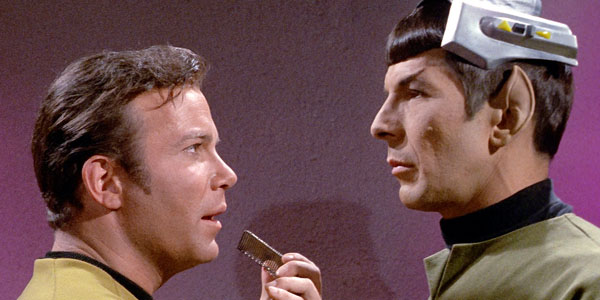 |
| Spock’s Brain |
Why? Because time has lent them a certain “kindly mocking” MST3K quality. Eventually, the same may be true for the weaknesses of Abrams’ films. In the meantime, let’s hope we can get some films that will never need MST3K treatment to justify their brilliance. I never feel the need to mock Star Treks II, IV or VI, all of which I definitely consider superior to the last four movies. Does that make me someone who holds onto the past? I guess that’s not for me to decide.
Elizabeth Weitz: I don’t know…I’ve been drinking.
Rich Handley: Right, that too.
Steven T Boltz: As much as I enjoyed the film, I don’t believe this is the case, for exactly the reasons Peter gave, above.
Bill Machon: YES.



































































































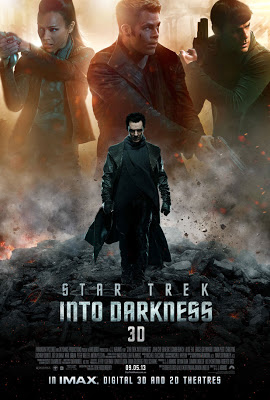
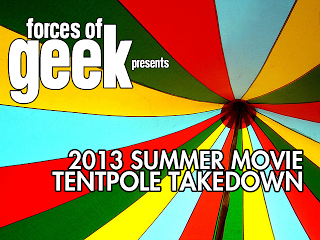
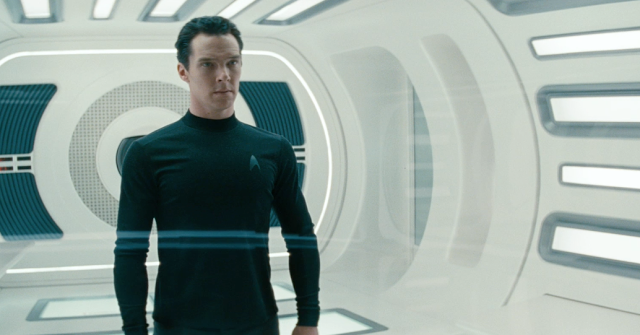
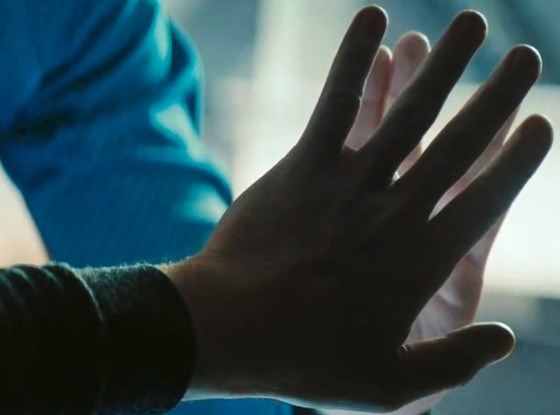
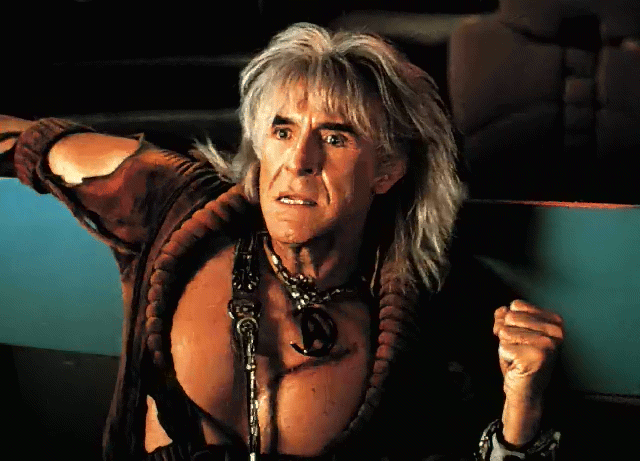
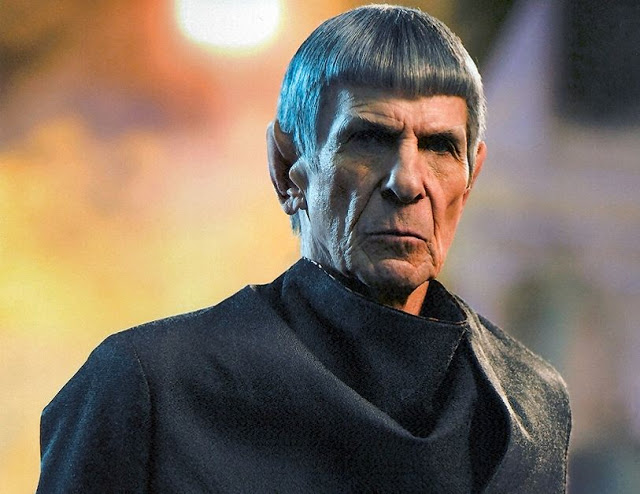
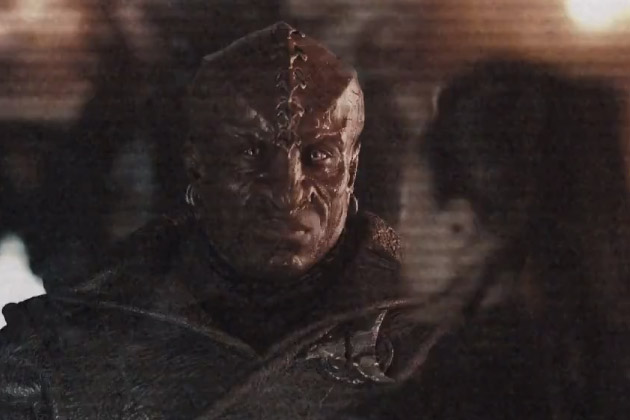
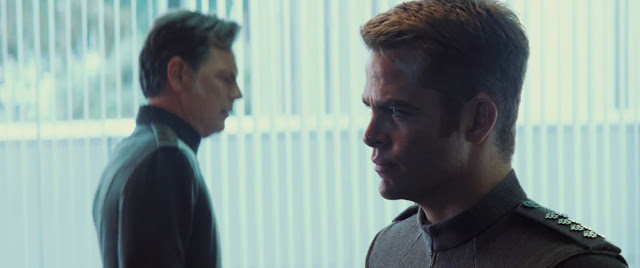
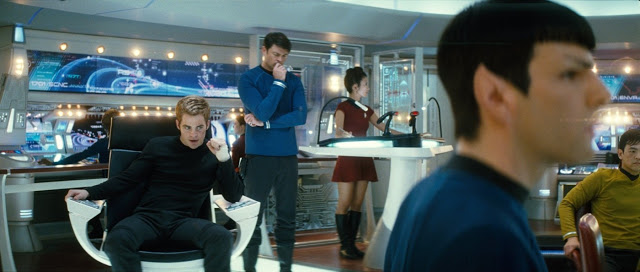
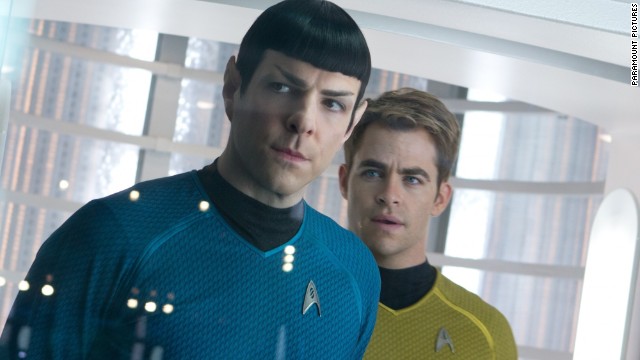







2 Comments